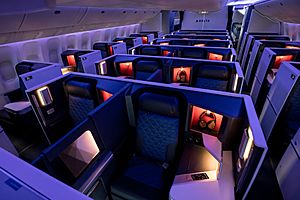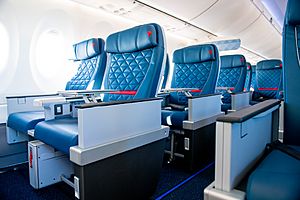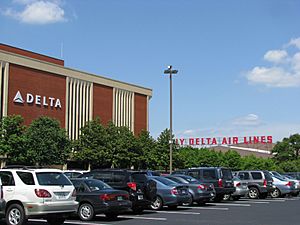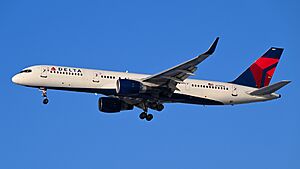Delta Air Lines facts for kids
A Delta Air Lines Airbus A350
|
|
| Founded | March 2, 1925 as Huff Daland Dusters, Inc. December 3, 1928 as Delta Air Service |
|---|---|
| Commenced operations | June 17, 1929 |
| AOC # | DALA026A |
| Hubs |
|
| Focus cities |
|
| Frequent-flyer program | SkyMiles |
| Alliance | |
| Subsidiaries |
|
| Fleet size | 987 |
| Destinations | 311 |
| Headquarters | Atlanta, Georgia, United States |
| Key people | |
| Revenue | |
| Operating income | |
| Net income | |
| Total assets | |
| Total equity | |
| Employees | 103,000 (2023) |
Delta Air Lines, Inc. is a major airline in the United States. Its main office is in Atlanta, Georgia. Delta has nine main bases, called hubs, with Hartsfield–Jackson Atlanta International Airport in Atlanta being the biggest.
Delta and its smaller partner airlines, known as Delta Connection, fly over 5,400 flights every day. They reach 325 places in 52 countries across six continents. Delta is also a founding member of SkyTeam, a group of airlines that work together to offer more flights around the world. It is the second-oldest airline in the U.S. that still flies passengers.
Delta is known for having the most money earned and the highest brand value among the world's largest airlines. It is also second in the number of passengers carried and the size of its fleet (all its planes). Delta has been ranked as a top airline by The Wall Street Journal for several years and won awards from Condé Nast Traveler.
Contents
Delta's Journey: How It Started
Early Flights and Growth
Delta Air Lines began on March 2, 1925, as a company called Huff Daland Dusters, Inc.. This company was the first in the world to use planes to spray crops. They started in Macon, Georgia, and then moved to Monroe, Louisiana. Their planes, called Huff-Daland Dusters, helped farmers fight tiny bugs called boll weevils that harmed cotton crops.
C.E. Woolman, who later became Delta's first CEO, led a group of local people to buy the crop-dusting company. On December 3, 1928, they started a new company called Delta Air Service, named after the Mississippi Delta region.
Passenger flights began on June 17, 1929. The first route went from Dallas, Texas, to Jackson, Mississippi, with stops in Shreveport and Monroe, Louisiana. By June 1930, they were flying as far east as Atlanta and as far west as Fort Worth, Texas. However, passenger service stopped in October 1930 because another airline won the contract to carry mail on that route.
But Delta didn't give up! In 1934, Delta Air Corporation got a contract to carry airmail. They started flying as Delta Air Lines on Mail Route 24, which went from Fort Worth, Texas, to Charleston, South Carolina. In 1941, Delta moved its main office from Monroe, Louisiana, to its current home in Atlanta. The company officially became Delta Air Lines in 1945.
Big Steps in Flying
In 1946, Delta started regularly scheduled cargo flights. In 1949, they offered the first discounted plane tickets between Chicago and Miami. Delta started its first international flights in 1953 after buying another airline called Chicago and Southern Air Lines.
Delta was a leader in using new planes. In 1959, it was the first airline to fly the Douglas DC-8. In 1960, it was the first to fly Convair 880 jets. Delta also used computers early on, launching its Deltamatic reservation system in 1964. In 1965, it was the first airline to fly the McDonnell Douglas DC-9.
Growing Bigger with Other Airlines
By 1970, all of Delta's planes were jets. In 1972, Delta bought Northeast Airlines. In 1978, Delta started flying across the Atlantic Ocean with direct flights from Atlanta to London.
Delta launched its frequent-flyer program in 1981, which lets passengers earn points for flying. In 1987, Delta bought Western Airlines and also started flying across the Pacific Ocean to Tokyo. In 1990, Delta was the first U.S. airline to fly McDonnell Douglas MD-11 jets. In 1991, Delta took over many of Pan Am's routes across the Atlantic, making Delta a top airline for flights to Europe.
In 1997, Delta was the first airline to carry more than 100 million passengers in one year. That same year, Delta also started flying to more places in Latin America.
Challenges and New Beginnings
On September 14, 2005, Delta had to file for bankruptcy because fuel costs were very high. But they worked hard to fix things and came out of bankruptcy in April 2007. Their shares were then listed on the New York Stock Exchange again.
Joining Forces with Northwest Airlines
Delta announced it would buy Northwest Airlines on April 14, 2008. The deal was approved on October 29, 2008. Northwest continued to operate as a part of Delta until December 31, 2009, when their flight operations officially merged. By January 31, 2010, Northwest Airlines' brand was officially retired, and everything was combined under the Delta name.
Where Delta Flies
Delta and its partner airlines fly to over 15,000 places every day. In the summer of 2024, Delta had 893 daily flights from its main hub in Atlanta. As of December 31, 2021, Delta's main planes fly to 242 destinations in 52 countries across six continents.
Destinations Around the World
As of May 2025, Delta Air Lines flies to many places. This list does not include places served by Delta's regional partner, Delta Connection.
| Country or Territory | City | Airport | Notes | Refs |
|---|---|---|---|---|
| Antigua and Barbuda | Osbourn | V. C. Bird International Airport | Seasonal | |
| Argentina | Buenos Aires | Ministro Pistarini International Airport | ||
| Aruba | Oranjestad | Queen Beatrix International Airport | ||
| Australia | Brisbane | Brisbane Airport | Seasonal | |
| Melbourne | Melbourne Airport | Begins December 3, 2025 | ||
| Sydney | Sydney Airport | |||
| Austria | Vienna | Vienna International Airport | Terminated | |
| Bahamas | Freeport | Grand Bahama International Airport | Terminated | |
| George Town | Exuma International Airport | |||
| Nassau | Lynden Pindling International Airport | |||
| Barbados | Bridgetown | Grantley Adams International Airport | ||
| Belgium | Brussels | Brussels Airport | ||
| Belize | Belize City | Philip S. W. Goldson International Airport | ||
| Bermuda | Hamilton | L.F. Wade International Airport | ||
| Bonaire | Kralendijk | Flamingo International Airport | ||
| Brazil | Brasília | Brasília International Airport | Terminated | |
| Fortaleza | Pinto Martins International Airport | Terminated | ||
| Manaus | Eduardo Gomes International Airport | Terminated | ||
| Recife | Recife/Guararapes–Gilberto Freyre International Airport | Terminated | ||
| Rio de Janeiro | Rio de Janeiro/Galeão International Airport | |||
| São Paulo | São Paulo/Guarulhos International Airport | |||
| Canada | Calgary | Calgary International Airport | ||
| Edmonton | Edmonton International Airport | Terminated | ||
| Montreal | Montréal–Trudeau International Airport | |||
| Saskatoon | Saskatoon John G. Diefenbaker International Airport | Terminated | ||
| Toronto | Toronto Pearson International Airport | |||
| Vancouver | Vancouver International Airport | |||
| Winnipeg | Winnipeg James Armstrong Richardson International Airport | |||
| Cayman Islands | Grand Cayman | Owen Roberts International Airport | ||
| Chile | Santiago | Arturo Merino Benítez International Airport | ||
| China | Beijing | Beijing Capital International Airport | Terminated | |
| Beijing Daxing International Airport | Terminated | |||
| Shanghai | Shanghai Pudong International Airport | |||
| Colombia | Bogotá | El Dorado International Airport | ||
| Cartagena | Rafael Núñez International Airport | |||
| Medellín | José María Córdova International Airport | Terminated | ||
| Costa Rica | Liberia | Daniel Oduber Quirós International Airport | ||
| San José | Juan Santamaría International Airport | |||
| Croatia | Dubrovnik | Dubrovnik Airport | Terminated | |
| Cuba | Havana | Jose Marti International Airport | ||
| Curaçao | Willemstad | Hato International Airport | ||
| Czech Republic | Prague | Václav Havel Airport Prague | Seasonal | |
| Denmark | Copenhagen | Copenhagen Airport | ||
| Dominican Republic | Puerto Plata | Gregorio Luperón International Airport | ||
| Punta Cana | Punta Cana International Airport | |||
| Santiago de los Caballeros | Cibao International Airport | |||
| Santo Domingo | General Andrews Airport | Terminated | ||
| Las Américas International Airport | ||||
| Ecuador | Guayaquil | José Joaquín de Olmedo International Airport | Terminated | |
| Quito | Mariscal Sucre International Airport | |||
| Egypt | Cairo | Cairo International Airport | Terminated | |
| Sharm El Sheikh | Sharm El Sheikh International Airport | Terminated | ||
| El Salvador | San Salvador | Monseñor Óscar Arnulfo Romero International Airport | ||
| Finland | Helsinki | Helsinki Airport | Terminated | |
| France | Lyon | Lyon–Saint-Exupéry Airport | Terminated | |
| Nice | Nice Côte d'Azur Airport | Seasonal | ||
| Paris | Charles de Gaulle Airport | |||
| Orly Airport | Terminated | |||
| French Polynesia | Papeete | Faa'a International Airport | ||
| Germany | Berlin | Berlin Brandenburg Airport | Seasonal | |
| Berlin Tegel Airport | Airport closed | |||
| Düsseldorf | Düsseldorf Airport | Terminated | ||
| Frankfurt | Frankfurt Airport | |||
| Hamburg | Hamburg Airport | Terminated | ||
| Munich | Munich Airport | |||
| Stuttgart | Stuttgart Airport | Terminated | ||
| Ghana | Accra | Kotoka International Airport | ||
| Greece | Athens | Athens International Airport | ||
| Grenada | St. George's | Maurice Bishop International Airport | Resumes January 6, 2026 | |
| Guadeloupe | Pointe-à-Pitre | Pointe-à-Pitre International Airport | Terminated | |
| Guam | Hagåtña | Antonio B. Won Pat International Airport | Terminated | |
| Guatemala | Guatemala City | La Aurora International Airport | ||
| Guyana | Georgetown | Cheddi Jagan International Airport | Terminated | |
| Haiti | Port-au-Prince | Toussaint Louverture International Airport | Terminated | |
| Honduras | Roatán | Juan Manuel Gálvez International Airport | ||
| San Pedro Sula | Ramón Villeda Morales International Airport | |||
| Tegucigalpa | Toncontín International Airport | Terminated | ||
| Hong Kong | Hong Kong | Hong Kong International Airport | Resumes June 6, 2026 | |
| Kai Tak Airport | Airport closed | |||
| Hungary | Budapest | Budapest Ferenc Liszt International Airport | Terminated | |
| Iceland | Reykjavík | Keflavík International Airport | Seasonal | |
| India | Chennai | Chennai International Airport | Terminated | |
| Delhi | Indira Gandhi International Airport | Terminated | ||
| Mumbai | Chhatrapati Shivaji Maharaj International Airport | Terminated | ||
| Ireland | Dublin | Dublin Airport | ||
| Shannon | Shannon Airport | Seasonal | ||
| Israel | Tel Aviv | Ben Gurion Airport | ||
| Italy | Catania | Catania Fontanarossa Airport | ||
| Milan | Milan Malpensa Airport | |||
| Naples | Naples International Airport | Seasonal | ||
| Pisa | Pisa International Airport | Terminated | ||
| Rome | Rome Fiumicino Airport | |||
| Venice | Venice Marco Polo Airport | |||
| Jamaica | Kingston | Norman Manley International Airport | ||
| Montego Bay | Sangster International Airport | |||
| Japan | Fukuoka | Fukuoka Airport | Terminated | |
| Nagoya | Chubu Centrair International Airport | Terminated | ||
| Nagoya Komaki Airport | Terminated | |||
| Osaka | Kansai International Airport | Terminated | ||
| Tokyo | Haneda Airport | |||
| Narita International Airport | Terminated | |||
| Jordan | Amman | Queen Alia International Airport | Terminated | |
| Kuwait | Kuwait City | Kuwait International Airport | Terminated | |
| Liberia | Monrovia | Roberts International Airport | Terminated | |
| Mexico | Acapulco | Acapulco International Airport | Terminated | |
| Cancún | Cancún International Airport | |||
| Cozumel | Cozumel International Airport | |||
| Guadalajara | Guadalajara International Airport | |||
| Ixtapa | Ixtapa-Zihuatanejo International Airport | Terminated | ||
| Mazatlán | Mazatlán International Airport | |||
| Mexico City | Mexico City International Airport | |||
| Monterrey | Monterrey International Airport | |||
| Puerto Vallarta | Licenciado Gustavo Díaz Ordaz International Airport | |||
| San José del Cabo | Los Cabos International Airport | |||
| Tulum | Tulum International Airport | |||
| Morocco | Marrakech | Marrakesh Menara Airport | Begins October 25, 2025 | |
| Netherlands | Amsterdam | Amsterdam Airport Schiphol | ||
| New Zealand | Auckland | Auckland Airport | Seasonal | |
| Nicaragua | Managua | Augusto C. Sandino International Airport | Terminated | |
| Nigeria | Abuja | Nnamdi Azikiwe International Airport | Terminated | |
| Lagos | Murtala Muhammed International Airport | |||
| Northern Mariana Islands | Saipan | Saipan International Airport | Terminated | |
| Palau | Koror | Roman Tmetuchl International Airport | Terminated | |
| Panama | Panama City | Tocumen International Airport | ||
| Peru | Lima | Jorge Chávez International Airport | ||
| Philippines | Manila | Ninoy Aquino International Airport | Terminated | |
| Poland | Warsaw | Warsaw Chopin Airport | Terminated | |
| Portugal | Lisbon | Lisbon Airport | ||
| Ponta Delgada | João Paulo II Airport | Terminated | ||
| Puerto Rico | San Juan | Fernando Luis Ribas Dominicci Airport | Terminated | |
| Luis Muñoz Marín International Airport | ||||
| Romania | Bucharest | Bucharest Henri Coandă International Airport | Terminated | |
| Russia | Moscow | Sheremetyevo International Airport | Terminated | |
| Saint Petersburg | Pulkovo Airport | Terminated | ||
| Saint Kitts and Nevis | Saint Kitts | Robert L. Bradshaw International Airport | Seasonal | |
| Saint Lucia | Vieux-Fort | Hewanorra International Airport | ||
| Senegal | Dakar | Blaise Diagne International Airport | ||
| Léopold Sédar Senghor International Airport | Terminated | |||
| Singapore | Singapore | Changi Airport | Terminated | |
| Sint Maarten | Philipsburg | Princess Juliana International Airport | ||
| South Africa | Cape Town | Cape Town International Airport | ||
| Johannesburg | O. R. Tambo International Airport | |||
| South Korea | Busan | Gimhae International Airport | Terminated | |
| Seoul | Gimpo International Airport | Terminated | ||
| Incheon International Airport | ||||
| Spain | Barcelona | Josep Tarradellas Barcelona–El Prat Airport | ||
| Madrid | Madrid–Barajas Airport | |||
| Málaga | Málaga Airport | Terminated | ||
| Valencia | Valencia Airport | Terminated | ||
| Sweden | Stockholm | Stockholm Arlanda Airport | ||
| Switzerland | Geneva | Geneva Airport | ||
| Zurich | Zurich Airport | |||
| Taiwan | Taipei | Taoyuan International Airport | ||
| Thailand | Bangkok | Don Mueang International Airport | Terminated | |
| Suvarnabhumi Airport | Terminated | |||
| Trinidad and Tobago | Port of Spain | Piarco International Airport | Terminated | |
| Turkey | Istanbul | Atatürk Airport | Airport closed | |
| Turks and Caicos Islands | Providenciales | Providenciales International Airport | ||
| Ukraine | Kyiv | Boryspil International Airport | Terminated | |
| United Arab Emirates | Dubai | Dubai International Airport | Terminated | |
| United Kingdom | Edinburgh | Edinburgh Airport | Seasonal | |
| Glasgow | Glasgow Airport | Terminated | ||
| London | Gatwick Airport | Seasonal | ||
| Heathrow Airport | ||||
| Manchester | Manchester Airport | Terminated | ||
| United States (Alabama) | Birmingham | Birmingham–Shuttlesworth International Airport | ||
| Huntsville | Huntsville International Airport | |||
| Mobile | Mobile Regional Airport | |||
| United States (Alaska) | Anchorage | Ted Stevens Anchorage International Airport | ||
| Fairbanks | Fairbanks International Airport | |||
| Juneau | Juneau International Airport | Seasonal | ||
| United States (Arizona) | Phoenix | Phoenix Sky Harbor International Airport | ||
| Tucson | Tucson International Airport | |||
| United States (Arkansas) | Fayetteville | Northwest Arkansas National Airport | ||
| Hot Springs | Memorial Field Airport | Terminated | ||
| Little Rock | Clinton National Airport | |||
| United States (California) | Burbank | Hollywood Burbank Airport | ||
| Fresno | Fresno Yosemite International Airport | Seasonal | ||
| Long Beach | Long Beach Airport | |||
| Los Angeles | Los Angeles International Airport | Hub | ||
| Oakland | Oakland San Francisco Bay Airport | Seasonal | ||
| Ontario | Ontario International Airport | |||
| Palm Springs | Palm Springs International Airport | Seasonal | ||
| Sacramento | Sacramento International Airport | |||
| San Diego | San Diego International Airport | |||
| San Francisco | San Francisco International Airport | |||
| San Jose | San Jose International Airport | |||
| Santa Ana | John Wayne Airport | |||
| Santa Barbara | Santa Barbara Municipal Airport | Seasonal | ||
| United States (Colorado) | Aspen | Aspen/Pitkin County Airport | Terminated | |
| Colorado Springs | Colorado Springs Airport | |||
| Denver | Denver International Airport | |||
| Stapleton International Airport | Airport closed | |||
| Hayden | Yampa Valley Airport | Seasonal | ||
| Montrose | Montrose Regional Airport | Seasonal | ||
| Vail | Eagle County Airport | Seasonal | ||
| United States (Connecticut) | Hartford | Bradley International Airport | ||
| United States (District of Columbia) | Washington, D.C. | Dulles International Airport | ||
| Ronald Reagan Washington National Airport | ||||
| United States (Florida) | Daytona Beach | Daytona Beach International Airport | ||
| Fort Lauderdale | Fort Lauderdale–Hollywood International Airport | |||
| Fort Myers | Southwest Florida International Airport | Seasonal | ||
| Fort Walton Beach | Destin–Fort Walton Beach Airport | |||
| Gainesville | Gainesville Regional Airport | |||
| Jacksonville | Jacksonville International Airport | |||
| Key West | Key West International Airport | |||
| Melbourne | Melbourne Orlando International Airport | |||
| Miami | Miami International Airport | |||
| Orlando | Orlando International Airport | |||
| Panama City | Northwest Florida Beaches International Airport | |||
| Pensacola | Pensacola International Airport | |||
| Sarasota | Sarasota–Bradenton International Airport | |||
| St. Petersburg | St. Pete–Clearwater International Airport | Terminated | ||
| Tallahassee | Tallahassee International Airport | |||
| Tampa | Tampa International Airport | |||
| West Palm Beach | Palm Beach International Airport | |||
| United States (Georgia) | Atlanta | Hartsfield–Jackson Atlanta International Airport | Hub | |
| Augusta | Augusta Regional Airport | |||
| Columbus | Columbus Airport | |||
| Savannah | Savannah International Airport | |||
| United States (Hawaii) | Honolulu | Daniel K. Inouye International Airport | ||
| Kahului | Kahului Airport | |||
| Kona | Kona International Airport | |||
| Lihue | Lihue Airport | |||
| United States (Idaho) | Boise | Boise Airport | ||
| Idaho Falls | Idaho Falls Regional Airport | |||
| Twin Falls | Magic Valley Regional Airport | |||
| Pocatello | Pocatello Regional Airport | |||
| United States (Illinois) | Bloomington/Normal | Central Illinois Regional Airport | ||
| Chicago | Midway International Airport | |||
| O'Hare International Airport | ||||
| Moline | Quad Cities International Airport | |||
| Peoria | General Wayne A. Downing Peoria International Airport | Terminated | ||
| United States (Indiana) | Evansville | Evansville Regional Airport | ||
| Kokomo | Kokomo Municipal Airport | Terminated | ||
| Fort Wayne | Fort Wayne International Airport | Seasonal | ||
| Indianapolis | Indianapolis International Airport | |||
| Richmond | Richmond Municipal Airport | Terminated | ||
| South Bend | South Bend International Airport | |||
| Terre Haute | Terre Haute Regional Airport | Terminated | ||
| United States (Iowa) | Cedar Rapids | Eastern Iowa Airport | ||
| Des Moines | Des Moines International Airport | |||
| United States (Kansas) | Wichita | Wichita Dwight D. Eisenhower National Airport | ||
| United States (Kentucky) | Lexington | Blue Grass Airport | ||
| Louisville | Louisville International Airport | |||
| Paducah | Barkley Regional Airport | Terminated | ||
| United States (Louisiana) | Baton Rouge | Baton Rouge Metropolitan Airport | ||
| Lafayette | Lafayette Regional Airport | |||
| New Orleans | Louis Armstrong New Orleans International Airport | |||
| Shreveport | Shreveport Regional Airport | |||
| Monroe | Monroe Regional Airport (Louisiana) | |||
| United States (Maine) | Bangor | Bangor International Airport | ||
| Portland | Portland International Jetport | |||
| Presque Isle | Presque Isle International Airport | Terminated | ||
| United States (Maryland) | Baltimore | Baltimore/Washington International Airport | ||
| United States (Massachusetts) | Boston | Logan International Airport | Hub | |
| New Bedford | New Bedford Regional Airport | Terminated | ||
| Worcester | Worcester Regional Airport | |||
| United States (Michigan) | Detroit | Detroit Metropolitan Wayne County Airport | Hub | |
| Flint | Bishop International Airport | Terminated | ||
| Grand Rapids | Gerald R. Ford International Airport | |||
| Lansing | Capital Region International Airport | Terminated | ||
| Traverse City | Cherry Capital Airport | Seasonal | ||
| United States (Minnesota) | Duluth | Duluth International Airport | Seasonal | |
| Bemidji | Bemidji Regional Airport | |||
| Minneapolis | Minneapolis–Saint Paul International Airport | Hub | ||
| United States (Mississippi) | Columbus | Golden Triangle Regional Airport | ||
| Greenwood | Greenwood Municipal Airport | Terminated | ||
| Gulfport | Gulfport–Biloxi International Airport | |||
| Jackson | Jackson International Airport | |||
| Meridian | Meridian Regional Airport | Terminated | ||
| United States (Missouri) | Kansas City | Kansas City International Airport | ||
| Springfield | Springfield–Branson National Airport | |||
| St. Louis | St. Louis Lambert International Airport | |||
| United States (Montana) | Billings | Billings Logan International Airport | ||
| Bozeman | Bozeman Yellowstone International Airport | |||
| Butte | Bert Mooney Airport | Terminated | ||
| Great Falls | Great Falls International Airport | Terminated | ||
| Helena | Helena Regional Airport | Terminated | ||
| Kalispell | Glacier Park International Airport | |||
| Missoula | Missoula International Airport | |||
| United States (Nebraska) | Lincoln | Lincoln Airport | Terminated | |
| Omaha | Eppley Airfield | |||
| United States (Nevada) | Las Vegas | Harry Reid International Airport | ||
| Reno | Reno–Tahoe International Airport | |||
| Elko | Elko Regional Airport | |||
| United States (New Hampshire) | Keene | Dillant-Hopkins Airport | Terminated | |
| Lebanon | Lebanon Municipal Airport (New Hampshire) | Terminated | ||
| Manchester | Manchester–Boston Regional Airport | Terminated | ||
| United States (New Jersey) | Newark | Newark Liberty International Airport | ||
| United States (New Mexico) | Albuquerque | Albuquerque International Sunport | ||
| United States (New York) | Albany | Albany International Airport | ||
| Buffalo | Buffalo Niagara International Airport | |||
| Newburgh | Stewart International Airport | Terminated | ||
| New York City | John F. Kennedy International Airport | Hub | ||
| LaGuardia Airport | Hub | |||
| Rochester | Greater Rochester International Airport | |||
| Syracuse | Syracuse Hancock International Airport | |||
| White Plains | Westchester County Airport | |||
| United States (North Carolina) | Asheville | Asheville Regional Airport | ||
| Charlotte | Charlotte Douglas International Airport | |||
| Fayetteville | Fayetteville Regional Airport | |||
| Greensboro | Piedmont Triad International Airport | |||
| Jacksonville | Albert J. Ellis Airport | |||
| Raleigh | Raleigh–Durham International Airport | Focus city | ||
| Wilmington | Wilmington International Airport | |||
| United States (North Dakota) | Bismarck | Bismarck Municipal Airport | ||
| Fargo | Hector International Airport | |||
| Grand Forks | Grand Forks International Airport | |||
| Minot | Minot International Airport | |||
| United States (Ohio) | Akron | Akron–Canton Airport | Terminated | |
| Cincinnati | Cincinnati Municipal Lunken Airport | Terminated | ||
| Cincinnati/Covington | Cincinnati/Northern Kentucky International Airport | |||
| Cleveland | Cleveland Hopkins International Airport | |||
| Columbus | John Glenn Columbus International Airport | |||
| Dayton | Dayton International Airport | |||
| Toledo | Toledo Express Airport | Terminated | ||
| United States (Oklahoma) | Oklahoma City | Will Rogers World Airport | ||
| Tulsa | Tulsa International Airport | |||
| United States (Oregon) | Portland | Portland International Airport | ||
| United States (Pennsylvania) | Allentown | Lehigh Valley International Airport | Terminated | |
| Harrisburg | Harrisburg International Airport | |||
| Philadelphia | Philadelphia International Airport | |||
| Pittsburgh | Pittsburgh International Airport | |||
| Scranton | Wilkes-Barre/Scranton International Airport | Terminated | ||
| United States (Rhode Island) | Providence | Rhode Island T. F. Green International Airport | ||
| United States (South Carolina) | Charleston | Charleston International Airport | ||
| Columbia | Columbia Metropolitan Airport | |||
| Greenville | Greenville Downtown Airport | Terminated | ||
| Greenville–Spartanburg International Airport | ||||
| Myrtle Beach | Myrtle Beach International Airport | |||
| Spartanburg | Spartanburg Downtown Memorial Airport | Terminated | ||
| United States (South Dakota) | Sioux Falls | Sioux Falls Regional Airport | ||
| United States (Tennessee) | Bristol | Tri-Cities Regional Airport | ||
| Chattanooga | Chattanooga Metropolitan Airport | |||
| Knoxville | McGhee Tyson Airport | |||
| Memphis | Memphis International Airport | |||
| Nashville | Nashville International Airport | |||
| United States (Texas) | Amarillo | Rick Husband Amarillo International Airport | Terminated | |
| Austin | Austin–Bergstrom International Airport | |||
| Beaumont | Jack Brooks Regional Airport | Terminated | ||
| Corpus Christi | Corpus Christi International Airport | Terminated | ||
| Dallas/Fort Worth | Dallas Fort Worth International Airport | |||
| Dallas Love Field | ||||
| El Paso | El Paso International Airport | |||
| Fort Worth | Amon Carter Field | Terminated | ||
| Harlingen | Valley International Airport | Seasonal | ||
| Houston | George Bush Intercontinental Airport | |||
| William P. Hobby Airport | ||||
| Lubbock | Lubbock Preston Smith International Airport | Terminated | ||
| McAllen | McAllen Miller International Airport | |||
| San Antonio | San Antonio International Airport | |||
| Tyler | Tyler Pounds Regional Airport | Terminated | ||
| United States (Utah) | Salt Lake City | Salt Lake City International Airport | Hub | |
| St. George | St. George Regional Airport | |||
| Cedar City | Cedar City Regional Airport | |||
| United States (Vermont) | Burlington | Burlington International Airport | ||
| United States (Virginia) | Charlottesville | Charlottesville-Albemarle Airport | ||
| Newport News | Newport News/Williamsburg International Airport | Terminated | ||
| Norfolk | Norfolk International Airport | |||
| Richmond | Richmond International Airport | |||
| Roanoke | Roanoke Regional Airport | |||
| United States (Washington) | Pasco | Tri-Cities Airport | ||
| Seattle | Seattle–Tacoma International Airport | Hub | ||
| Spokane | Spokane International Airport | |||
| United States (West Virginia) | Charleston | Yeager Airport | ||
| United States (Wisconsin) | Appleton | Appleton International Airport | ||
| Green Bay | Green Bay–Austin Straubel International Airport | |||
| Madison | Dane County Regional Airport | |||
| Milwaukee | Milwaukee Mitchell International Airport | |||
| United States (Wyoming) | Casper | Casper-Natrona County International Airport | ||
| Cody | Yellowstone Regional Airport | Terminated | ||
| Jackson Hole | Jackson Hole Airport | |||
| United States Virgin Islands | Saint Croix | Henry E. Rohlsen International Airport | ||
| Saint Thomas | Cyril E. King Airport | |||
| Venezuela | Caracas | Simón Bolívar International Airport | Terminated | |
| Vietnam | Ho Chi Minh City | Tan Son Nhat International Airport | Terminated |
Delta's Main Hubs
Delta has nine main hubs, which are like busy central stations for their flights:
- Atlanta: This is Delta's biggest hub. It's the main gateway for flights to Latin America and the Caribbean. Delta's main office and maintenance base are also here.
- Boston: This hub is important for flights across the Atlantic Ocean to Europe and also to places in North America.
- Detroit: One of Delta's two hubs in the Midwest. It's a key airport for flights to Asia from the Eastern United States, and also serves many places in the Americas and Europe.
- Los Angeles: This is a major hub on the West Coast. It offers flights to Latin America, Asia, Australia, Europe, and many big cities in the U.S.
- Minneapolis/St. Paul: This is another Midwest hub. It's the main airport for flights to Canada and also serves many U.S. cities, including smaller ones in the upper Midwest, and some flights to Europe and Asia.
- New York–JFK: This is Delta's main hub for flights across the Atlantic to Europe. It also has special "prestige routes" to Los Angeles and San Francisco.
- New York–LaGuardia: This is New York's second Delta hub. It mainly serves many cities on the East Coast of the U.S. and some regional places in the U.S. and Canada.
- Salt Lake City: This hub serves the Rocky Mountain region of the United States. It connects to most major U.S. cities, many regional places in the Rocky Mountains, and some cities in Canada, Mexico, Europe, Hawaii, and Asia.
- Seattle/Tacoma: This is Delta's main hub on the West Coast. It's an important gateway for international flights to Asia from the Western United States. It also serves many major U.S. cities and regional places in the Pacific Northwest.
Delta Connection: Regional Flights
Delta Connection is the brand name for Delta's regional flights. These flights are operated by smaller airlines that partner with Delta. They help connect passengers from smaller cities to Delta's main hubs, making it easier to travel to more places.
Working with Other Airlines
Delta is a member of the SkyTeam alliance, which is a group of airlines that work together. Delta also has special agreements, called codeshare agreements, with many other airlines. This means you can book a flight with Delta, but actually fly on a partner airline's plane. This helps Delta offer more destinations around the world.
- Aerolíneas Argentinas
- Aeroméxico
- Air Europa
- Air France
- airBaltic
- China Airlines
- China Eastern Airlines
- El Al
- Garuda Indonesia
- Hawaiian Airlines
- ITA Airways
- Kenya Airways
- KLM
- Korean Air
- LATAM Airlines
- Rex Airlines
- Saudia
- Scandinavian Airlines
- Seaborne Airlines
- Shanghai Airlines
- Transavia
- Vietnam Airlines
- Virgin Atlantic
- WestJet
Delta's Fleet of Aircraft
Delta has a large fleet of planes, including many different types of aircraft. You can find more details about the specific planes Delta uses in the Delta Air Lines fleet article.
Inside Delta's Planes: Cabin Classes
In 2015, Delta updated its cabin classes to offer different experiences for passengers. The features might vary depending on your flight and the type of plane.
- Delta One
Delta One is Delta's best business class. It's available on long international flights and on special cross-country flights within the U.S., like from New York–Kennedy to Los Angeles and San Francisco.
Delta One seats can lie completely flat, like a bed. Most also offer direct access to the aisle from every seat, giving you more privacy. These seats have personal entertainment screens, power outlets, reading lights, and a folding table. Passengers in Delta One also get meals, drinks, a comfort kit, bedding, and access to special airport lounges before their flight.
In 2016, Delta introduced Delta One Suites on some of its larger planes. These suites have a door for even more privacy, more storage, and bigger entertainment screens. They are found on the Airbus A350 and Airbus A330-900 planes. Some Boeing 767-400ER planes also have similar seats with increased privacy, though without a door due to the plane's design.
- First Class
First Class is offered on most domestic flights and some shorter international flights. These seats are wider and have more legroom than other classes. Passengers get a wider choice of free snacks, free drinks (including alcohol), and full meal service on flights longer than 900 miles (about 1,450 km). Some planes also have power outlets and free entertainment. First Class passengers also get to board the plane first.
- Premium Select
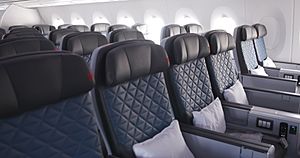
In 2016, Delta announced a new cabin class called Premium Select. This class offers more legroom, adjustable leg rests, wider seats, and more recline than regular economy seats. It also comes with a special premium service. Premium Select was first introduced on the new Airbus A350 planes in 2017. It is also available on the Airbus A330-900 and is being added to many Boeing 767-300ER and older Airbus A330 aircraft.
- Delta Comfort+
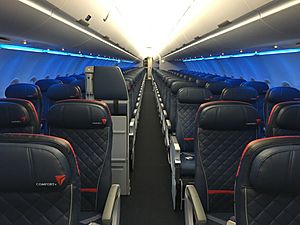
Delta Comfort+ seats are on all Delta planes. They offer more legroom and more recline than standard Main Cabin seats. Passengers in Comfort+ get priority boarding, dedicated space for their bags above their seats, free beer, wine, and spirits on flights over 250 miles (about 400 km), and free premium snacks on flights over 900 miles (about 1,450 km). Free entertainment is available, and headsets are provided on most flights.
- Main Cabin
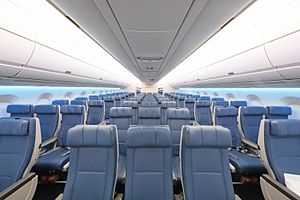
Main Cabin is the standard Economy Class, available on all Delta planes. Seats are between 17 and 18.6 inches (43 to 47 cm) wide and have 30 to 33 inches (76 to 84 cm) of legroom.
Main Cabin passengers get free snacks and non-alcoholic drinks on all flights 250 miles (about 400 km) or longer. Alcoholic drinks can be bought. On long international flights and some special cross-country domestic flights (like New York–JFK to Seattle, San Francisco, Los Angeles, and San Diego), free meals and alcoholic drinks are provided.
- Basic Economy
Basic Economy is a simpler version of Main Cabin. It offers the same services but with fewer options for changing your ticket and no upgrades, even if you fly often. Your seat is assigned when you check in. As of December 2021, Basic Economy travelers do not earn miles for free travel or points towards elite status.
Delta's Reward Programs
SkyMiles: Earn Rewards for Flying
SkyMiles is Delta Air Lines' program for frequent flyers. When you fly with Delta, you can earn miles that don't expire. These miles can be used for free flights and other rewards.
In 2025, Delta added new benefits for SkyMiles members, including free Wi-Fi on most domestic flights, improved Delta Sky Club lounges, and new food options.
Delta Sky Club: Airport Lounges
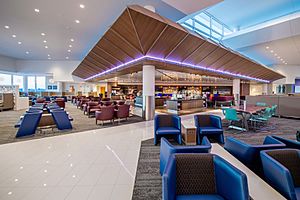
Delta Sky Club is the name for Delta's special airport lounges. You can become a member by buying an annual pass with money or miles. Passengers flying in Delta One class on international flights get free access. Some top-level Delta members or American Express cardholders can also get in for free.
In February 2024, Delta announced new, more exclusive Sky Club lounges for travelers who spend a lot. The first of these opened at New York's John F. Kennedy International Airport, with others planned for Boston and Los Angeles International Airport. These lounges offer special features like wellness areas and unique dining experiences.
SkyBonus: For Businesses
SkyBonus is a program for small to medium-sized businesses that spend between $5,000 and $500,000 on air travel each year. Businesses can earn points for free travel, upgrades, Sky Club memberships, and special status for their employees. Even when a business earns points, the person flying can still earn their own SkyMiles.
Delta's Operations
Headquarters and Offices
Delta's main office is in Atlanta, Georgia, right next to Hartsfield–Jackson Atlanta International Airport. This has been Delta's headquarters since 1941. The airport is also home to Delta TechOps, which is Delta's main center for maintaining and repairing its planes.
Delta also has a large presence in the Twin Cities (Minneapolis/St. Paul), with many employees and important corporate offices there, including its information technology division.
Delta's Look: Logo and Plane Paint
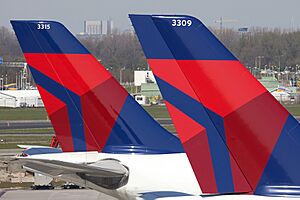
Delta's logo, often called the "widget," was first used in 1959. Its triangle shape comes from the Greek letter delta, and it reminds people of the airline's early days flying in the Mississippi Delta region. It also looks a bit like the swept-back wings of the DC-8, which was Delta's first jet plane.
Delta's current paint design on its planes is called "Upward & Onward." It has a white body with the company's name in blue letters and the "widget" logo on the tail. Delta started using this design in 2007 after it came out of bankruptcy. This new design uses fewer colors than the old one, which saves the airline money because it takes less time to paint each plane.
Protecting the Environment
In 2008, Delta Air Lines received an award for using a special product called PreKote. This product is better for the environment because it replaces harmful chemicals used to help paint stick to planes and prevent rust. PreKote also helps save water and reduces wastewater.
Using PreKote also saves money by making the painting process faster. This saves Delta over $1 million each year.
Delta has been working to reduce its carbon footprint (the amount of greenhouse gases it releases). While it used to buy carbon offsets (which are like paying to reduce emissions elsewhere), it has been focusing more on reducing emissions directly from its own flights since early 2022.
On-Time Flights
In 2023, Delta flights arrived on time 84.72% of the time. This was better than the average for North American airlines, which was 74.45%. Delta also completed 98.82% of its planned flights.
Awards and Recognition
On June 24, 2024, Skytrax voted Delta Air Lines the Best Airline in North America and for having the Best Airline Staff Service in North America.
Accidents and Incidents
For information about past accidents and incidents involving Delta's main planes, you can refer to the List of Delta Air Lines accidents and incidents. For incidents involving Northwest Airlines before it merged with Delta, see Northwest Airlines accidents and incidents. For incidents involving Delta Connection flights, see Delta Connection incidents and accidents.
Over the years, there have been 14 fatal accidents involving Delta planes where at least one person died. In total, 299 passengers and crew died in these accidents. Additionally, 11 people died in two other collision accidents, and 16 people on the ground died in four accidents.
Flight 705
NC49657
N4875C
Flight 9877
Flight 843
Flight 9570
Flight 954
Flight 723
Flight 516
Flight 523
Flight 1080
Flight 1061
September 13, 1980, Hijacking
Flight 722
Flight 784
Flight 357
Flight 191
Flight 1141
Flight 1554
Flight 1288
Flight 554
Flight 1989
Flight 1111
Flight 2348
See also
 In Spanish: Delta Air Lines para niños
In Spanish: Delta Air Lines para niños
- Air transportation in the United States
- Delta Flight Museum
- List of airlines of the United States
- List of airports in the United States
 | John T. Biggers |
 | Thomas Blackshear |
 | Mark Bradford |
 | Beverly Buchanan |


